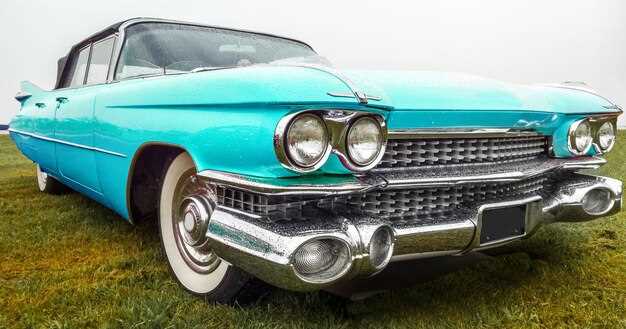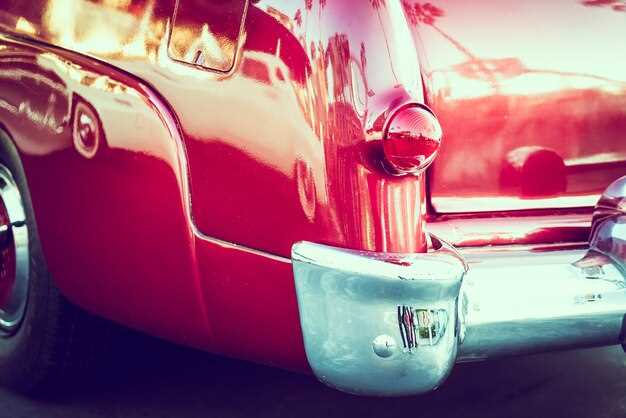
As the automobile industry evolves, vintage cars remain a cherished segment for collectors and enthusiasts alike. These classic vehicles, revered for their historical significance and unique designs, not only symbolize a bygone era but also represent potential investment opportunities. Diving into the world of vintage cars can be both an exciting and rewarding experience for those looking to enrich their collections.
In this article, we will explore some of the top vintage cars that every serious collector should consider adding to their garages. Each model we discuss offers its own unique blend of style, performance, and rarity, making them stand out in the crowded market of classic automobiles. Whether you’re a seasoned collector or new to the scene, understanding the key attributes of these iconic vehicles is essential for making informed purchasing decisions.
From the elegant lines of early 20th-century designs to the rugged charm of mid-century classics, the world of vintage cars is diverse and captivating. We will highlight not only their aesthetic appeal but also their historical context and significance. Investing in these timeless pieces of automotive art can be both a passion project and a financially sound decision for collectors striving to preserve the legacy of motoring history.
Identifying Classic Car Brands with High Value Appreciation
In the world of classic car collecting, certain brands have consistently shown remarkable value appreciation over time. Identifying these brands can profoundly impact investment decisions for collectors. A few standout manufacturers have established a reputation for producing vehicles that not only capture the essence of automotive history but also retain and even increase their value.
Ferrari is often at the forefront of classic car investments. Known for their limited production and iconic models, vintage Ferraris can appreciate dramatically, especially those associated with racing heritage or celebrity ownership. Models like the Ferrari 250 GTO are considered some of the most valuable cars ever sold at auction.
Porsche also stands out with its 911 series. Particularly models from the late 1960s and early 1970s, such as the 911 S, have seen significant appreciation. The brand’s combination of performance, engineering, and a dedicated fan base ensures its classics remain highly sought after.
Another notable brand is Mercedes-Benz, especially their models from the 1950s, such as the 300SL Gullwing. The elegance and engineering of these vehicles make them favorites among collectors, with values often rising sharply as the years pass.
British brands like Jaguar and Aston Martin have also proven to appreciate significantly. The Jaguar E-Type, regarded as one of the most beautiful cars in history, attracts considerable interest from collectors, driving up its value. Similarly, classic Aston Martins, particularly those linked to the James Bond franchise, have a designated collector market.
American muscle cars, particularly those from Ford and Chevrolet, should not be overlooked. The Ford Mustang and Chevrolet Camaro have a rich history and a loyal fan base, ensuring that specific models from their production years notably retain or increase their worth.
Lastly, exotic brands like Lamborghini and Bentley also present promising investment opportunities. The Countach and early Bentleys have become classics that collectors value highly for their unique designs and historical significance.
Ultimately, identifying classic car brands with high appreciation potential requires thorough research into market trends, auction results, and historical significance. By focusing on these prime brands, collectors can enhance their chances of acquiring vehicles that appreciate in value over time.
Understanding the Maintenance Requirements of Vintage Vehicles
Maintaining vintage vehicles requires a unique set of skills and knowledge. Unlike modern cars, which often feature advanced technology and standardized parts, vintage models may use outdated materials and components that necessitate careful handling and specialized attention.
Regular Inspections: Routine inspections are critical for vintage cars. Components such as brakes, tires, and exhaust systems should be checked often to ensure they remain in good condition. Pay close attention to rust or corrosion, particularly in vehicles that have not been stored properly.
Fluid Changes: Vintage vehicles often use different types of fluids compared to modern cars. Engine oil, transmission fluid, and coolant should be changed regularly, adhering to manufacturer specifications. Using the correct oils and fluids is vital, as they may differ in viscosity and chemical composition from those used in contemporary vehicles.
Parts Availability: Source original or reproduction parts to maintain authenticity and functionality. Building relationships with specialty suppliers or membership in vintage car clubs can be beneficial for locating hard-to-find components. Regularly check the condition of parts such as spark plugs, belts, and hoses, as these often degrade over time.
Storage Considerations: Proper storage is essential to protect vintage vehicles from environmental damage. Ideally, they should be kept in a climate-controlled garage, away from direct sunlight, moisture, and temperature extremes. Using a breathable car cover can help prevent dust accumulation while allowing moisture to escape.
Expert Care: Consider consulting with or hiring professionals who specialize in vintage automobiles. They can provide insights into specific maintenance practices and can perform repairs that require specialized skills or tools. Many classic vehicles have idiosyncrasies that may not be familiar to general mechanics.
Regular Driving: Vintage cars benefit from regular use. Driving helps keep the engine lubricated and prevents gaskets from drying out. Frequent short trips can lead to fuel system issues, so aim for longer drives when possible to keep all components functioning smoothly.
Understanding these maintenance requirements is essential for preserving the beauty and functionality of vintage vehicles, ensuring they remain a cherished part of any collector’s legacy.
Evaluating the Best Auctions and Shows for Vintage Car Purchases
When it comes to purchasing vintage cars, attending auctions and shows can provide both opportunities and insights. These events allow collectors to engage with sellers and other enthusiasts while gaining access to unique vehicles. The following criteria can help evaluate the best auctions and shows for vintage car purchases.
| Criteria | Description |
|---|---|
| Reputation | Consider auctions and shows with a strong reputation in the vintage car community. Research past events, reviews, and the expertise of organizers. |
| Variety of Offerings | Choose events that feature a wide range of classic cars from various eras and manufacturers. This variety increases the chances of finding the perfect model. |
| Expert Appraisals | Look for auctions or shows where certified appraisers are available. Their expertise can provide valuable insights regarding vehicle authenticity and market value. |
| Networking Opportunities | Events that attract fellow collectors, enthusiasts, and industry professionals can offer networking possibilities. Building relationships can lead to private sale opportunities. |
| Inspection Facilities | Ensure the venue allows for proper vehicle inspection. Good auctions will provide designated areas where you can examine cars closely before making a bid. |
| Pre-Auction Previews | Many reputable auctions offer previews of the cars for sale. Attending these previews allows potential buyers to assess vehicles firsthand. |
| Transparency and Bidding Process | Evaluate the bidding process to ensure it is fair and transparent. A clear and straightforward process builds confidence in the auction. |
Attending various vintage car auctions and shows will deepen knowledge of the market and enhance the chances of making a successful purchase. Always stay informed about upcoming events to take full advantage of the opportunities they present.
Researching the History and Provenance of Classic Cars
Understanding the history and provenance of classic cars is essential for any serious collector. Provenance refers to the documented history of a vehicle, including previous ownership, accidents, restorations, and any modifications that may have been made over the years. This background information helps to establish the vehicle’s authenticity, value, and potential for appreciation.
To begin the research process, start by gathering the vehicle’s identification number (VIN). This unique code can provide access to historical records, including production numbers, original specification sheets, and factory options. Various online databases and platforms offer VIN decoding services that enable collectors to uncover details about the car’s original configuration.
Another crucial source of information is the vehicle’s title and registration documents. These papers often indicate previous owners and states of registration, which can help trace the car’s lineage. Additionally, classic car clubs and enthusiast forums are treasure troves of knowledge; members often share information regarding specific makes and models, including potential pitfalls and valuable resources for tracing history.
Documentation plays a pivotal role in establishing provenance. Collectors should seek out service records, maintenance logs, and any restoration documents that may exist. A well-documented history adds credibility and can significantly enhance the car’s market value.
In some cases, service organizations such as the Classic Car Club of America or the International Car Show Association provide authentication services, which can further validate a car’s authenticity. Engaging with these organizations can also open access to technical resources and networking opportunities with other collectors.
Lastly, consider consulting professional appraisers or auction houses specializing in classic cars. Their expertise can provide insights into the vehicle’s historical significance and market trends. A well-informed decision based on thorough research not only protects your investment but also enriches your appreciation for the automotive history embodied in each classic car.
Connecting with Fellow Collectors and Vintage Car Enthusiasts

Building a network with other collectors and enthusiasts is essential for anyone passionate about vintage cars. Engaging with like-minded individuals can provide valuable insights, enhance your knowledge, and foster lasting friendships. Start by joining local car clubs that focus on vintage automobiles. These clubs often host events, meet-ups, and workshops where you can share experiences and learn from others.
Online forums and social media groups have become increasingly popular for connecting with fellow collectors. Platforms like Facebook, Reddit, and specialized car forums allow enthusiasts from all over the world to exchange tips, showcase their collections, and discuss restoration techniques. Participating actively in discussions can help you find mentorship opportunities and stay informed about industry trends.
Attending vintage car shows and auctions is another excellent way to meet other collectors. These events not only allow you to see rare models up close but also provide an avenue for networking. Engaging directly with other collectors can lead to potential partnerships, collaborations, and even exclusive purchase opportunities.
Lastly, consider joining or forming a vintage car restoration group. Working on projects with others cultivates a strong sense of community while allowing you to learn hands-on skills from more experienced members. Sharing challenges and successes with others enhances the overall collecting experience, turning individual interests into a collective passion.
Exploring Storage Options for Preserving Vintage Cars
Proper storage is crucial for maintaining the condition and value of vintage cars. Collectors must select the right environment to protect these automobiles from factors that can cause deterioration. Here are some storage options to consider:
-
Indoor Storage
- Climate-Controlled Garages: These spaces regulate temperature and humidity levels, protecting the vehicle from rust and mold.
- Storage Units: Renting a storage unit can provide a secure environment, especially those that offer climate control.
-
Outdoor Storage
- Car Covers: High-quality, breathable car covers shield vehicles from dust, moisture, and UV rays, but should not be used in extreme conditions.
- Custom Shelters: Portable carports or custom-built shelters can provide protection without the expense of building a garage.
-
Professional Storage Facilities
- Specialized Car Storage: These facilities are designed specifically for vintage and luxury cars, offering temperature control, security, and sometimes, maintenance services.
- Insurance Coverage: Professional facilities often provide insurance options, ensuring vehicles are protected against theft or damage.
Regardless of the chosen option, collectors should ensure that:
- The storage space is clean and free from contaminants.
- Proper ventilation is available to avoid moisture buildup.
- Regular inspections are conducted to catch any issues early.
Investing time and resources in appropriate storage ensures that vintage cars remain in pristine condition, ready for the road or the show. The right storage solution not only preserves the vehicle’s aesthetics and functionality but also enhances its long-term value.
